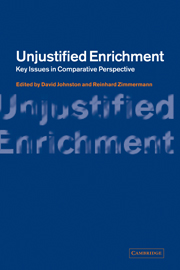Book contents
- Frontmatter
- Contents
- List of contributors
- Preface
- Table of cases
- List of abbreviations
- I Introduction
- II Enrichment ‘without legal ground’ or unjust factor approach
- III Failure of consideration
- 4 Failure of consideration: myth and meaning in the English law of restitution
- 5 Failure of consideration
- IV Duress and fraud
- V Change of position
- VI Illegality
- VII Encroachment and restitution for wrongs
- VIII Improvements
- IX Discharge of another person's debt
- X Third-party enrichment
- XI Proprietary issues
- XII Taxonomy
- Index
4 - Failure of consideration: myth and meaning in the English law of restitution
Published online by Cambridge University Press: 31 July 2009
- Frontmatter
- Contents
- List of contributors
- Preface
- Table of cases
- List of abbreviations
- I Introduction
- II Enrichment ‘without legal ground’ or unjust factor approach
- III Failure of consideration
- 4 Failure of consideration: myth and meaning in the English law of restitution
- 5 Failure of consideration
- IV Duress and fraud
- V Change of position
- VI Illegality
- VII Encroachment and restitution for wrongs
- VIII Improvements
- IX Discharge of another person's debt
- X Third-party enrichment
- XI Proprietary issues
- XII Taxonomy
- Index
Summary
The doctrine of failure of consideration is of vital importance to the modern law of restitution in common-law jurisdictions, but it is a doctrine about which there remains a great deal of uncertainty. By concentrating on the main principles and themes underlying this doctrine and by comparing it with equivalent civil-law concepts, it is possible to identify the ambit of the doctrine and resolve some of the uncertainties. The doctrine also provides a useful case study by reference to which the differences of approach in the application and understanding of the law of restitution in common-law and civil-law jurisdictions can be assessed. There are eleven issues concerning the doctrine of failure of consideration that deserve particular attention.
The meaning of consideration
The main reason why the doctrine of failure of consideration has caused a great deal of confusion derives from the fact that the notion of ‘consideration’ has two different meanings. First, there is the contractual sense whereby ‘consideration’ refers to the parties' promises in the contract. The mutual promises are the quid pro quo by virtue of which the contract becomes contractually binding. Alternatively, there is the restitutionary sense of ‘consideration’, which is not concerned with the existence of the promises under the contract as such but is more concerned with the performance of those promises.
Even as regards this restitutionary sense of ‘consideration’ there are different interpretations depending on the context in which the promise is made.
- Type
- Chapter
- Information
- Unjustified EnrichmentKey Issues in Comparative Perspective, pp. 103 - 127Publisher: Cambridge University PressPrint publication year: 2002



